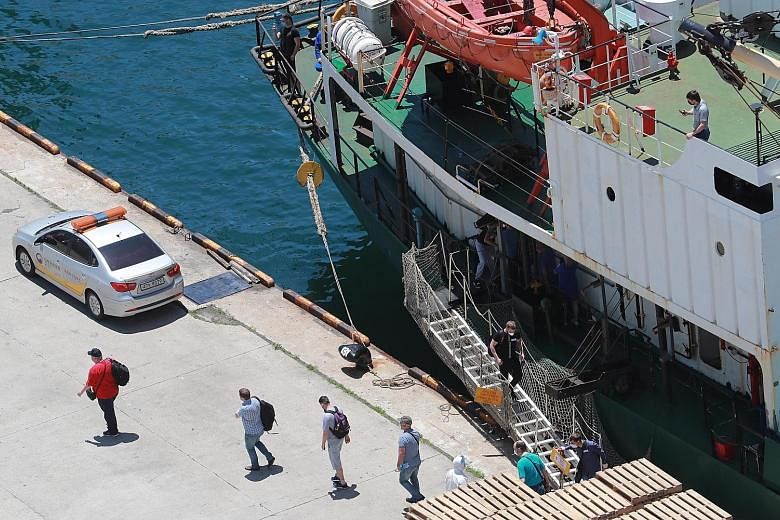South Korea is bracing itself for more imported cases of the coronavirus, after 16 infections on a Russian-flagged cargo ship docked at the southern port city of Busan added to a recent spike in case numbers that resulted from arrivals from Pakistan and Bangladesh.
Local cases also continued to grow, and the health authorities warned that a second wave of infections has already hit Seoul and greater Seoul - home to half of the country's 50 million people.
South Korea, a success story in curbing the virus in April, reported 46 new cases yesterday, 30 of them imported. This brings the total number of infections to 12,484, while the death toll has reached 281.
Half of the imported cases are linked to the cargo ship, which arrived from Vladivostok last Friday with a crew of 21. Three sailors were found with symptoms during a routine inspection by the South Korean authorities on Sunday.
Concern is rising over the possibility of community spread, as the health authorities have identified 176 people who had contact with the infected crew. They include port workers, repairmen and sailors from another Russian-flagged vessel, all of whom have been isolated and will undergo testing over the next few days.
The new cluster has raised questions over a possible lapse in virus screening procedures. The Korea Centres for Disease Control and Prevention said at a briefing yesterday that the Russian sailors received quarantine certificates from Busan port authorities even without submitting health questionnaires.
The ship's operator also did not inform South Korea that its captain had returned to Russia a week ago after developing fever and other symptoms. His test results came back positive on Monday.
Quarantine officials said they are considering holding physical inspections on board vessels arriving from Russia, instead of relying on electronic submissions of quarantine documents.
Separately, South Korea has suspended visas and flights from Pakistan and Bangladesh to curb a spike in imported cases from these two countries.
Of the 31 imported cases reported last Saturday, 16 were detected upon arrival from Pakistan and seven from Bangladesh.
Health officials said South Korea receives 3,000 to 4,000 international visitors a day, and border checkpoints are facing a shortage of workers to conduct the strenuous work of screening for the virus.
The number of imported cases rose to 90 last week - almost double the figure of the previous week.
Yesterday was the first time in almost 40 days that the number of imported cases (30) surpassed local infections (16). Daily imported cases fell to single digits after South Korea strengthened quarantine measures for international arrivals in April, but jumped to double digits in the middle of this month.
Meanwhile, community infections continue to grow and pose a challenge to health authorities.
Seoul and greater Seoul accounted for most of the community infections this month, and the authorities are considering tougher preventive measures.
The number of cases traced to a Seoul-based health-product retailer, Richway, rose by four to 202 yesterday, while a daycare centre for seniors, also in Seoul, registered two more cases for a total of 45.
Seoul Mayor Park Won-soon cited warnings from experts that the number of daily cases could grow to 800 in a month, given the "high R number" of 1.79. The R number, or reproduction rate, refers to the average number of people infected by a confirmed patient.
The looming crisis has come much sooner than earlier forecasts of a second peak in autumn, he said, urging people to follow preventive measures such as wearing masks and avoiding confined spaces.
President Moon Jae-in has also stressed the importance of guarding against further spread of the virus, noting that "it is no exaggeration to say that the stability of the coronavirus situation depends on the capital area".
Speaking at a Cabinet meeting yesterday, Mr Moon also urged Parliament to approve a third supplementary budget worth 35.3 trillion won (S$40.6 billion) submitted three weeks ago, as a further delay would "increase the suffering of the people" and derail plans for economic recovery.
In an expansion of preventive steps implemented since June 10, certain businesses are now required by law to use a quick response (QR) code system to record visitor entries to facilitate contact tracing. The system applies to high-risk venues such as buffet restaurants, private academies and logistics facilities.

